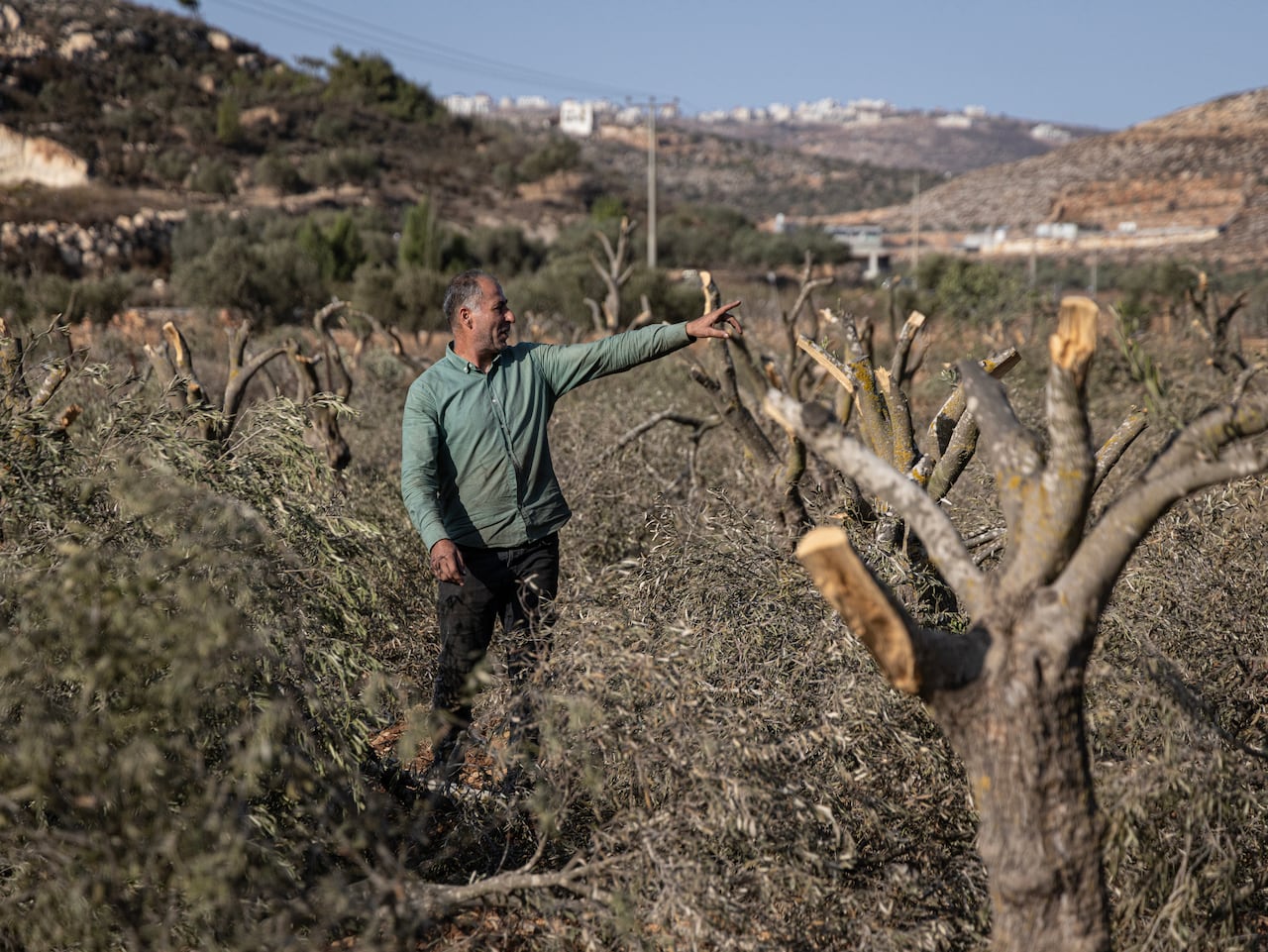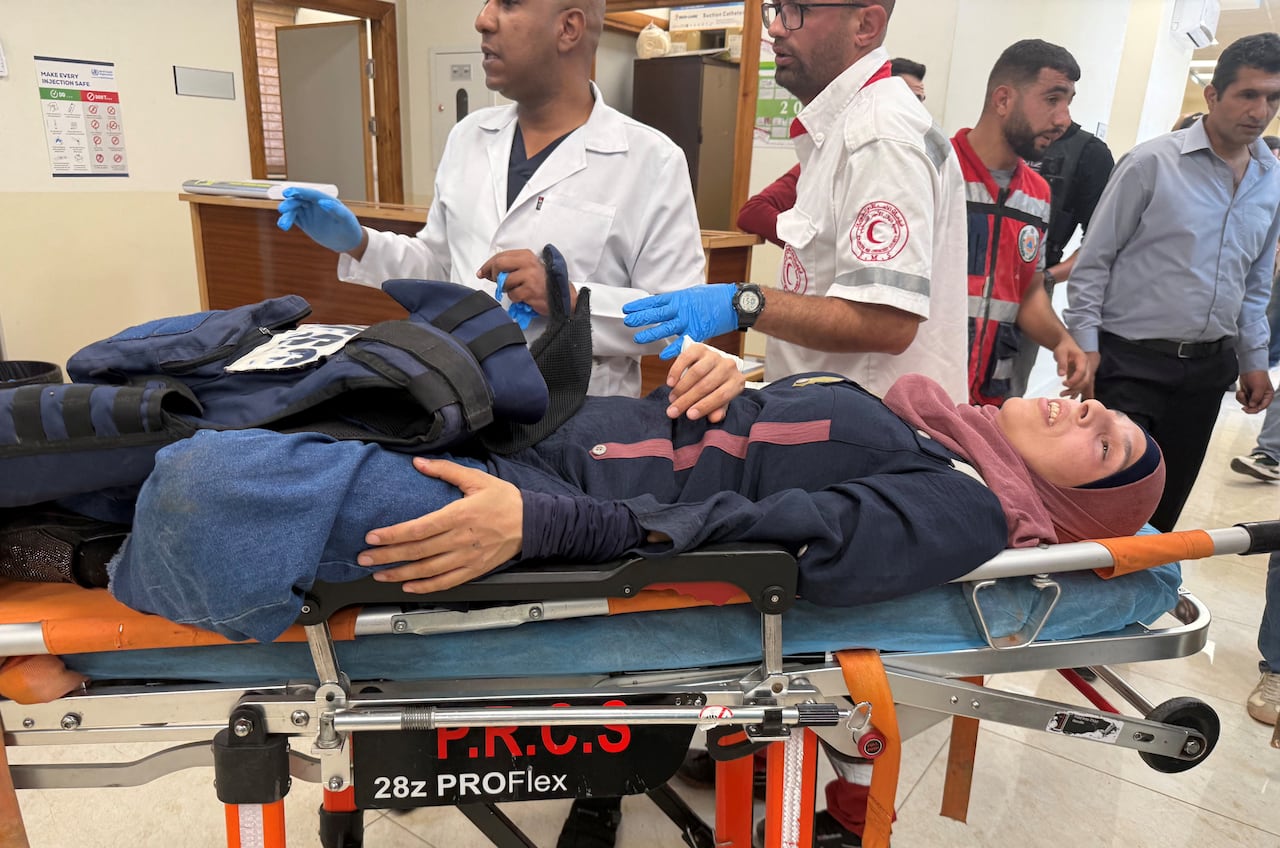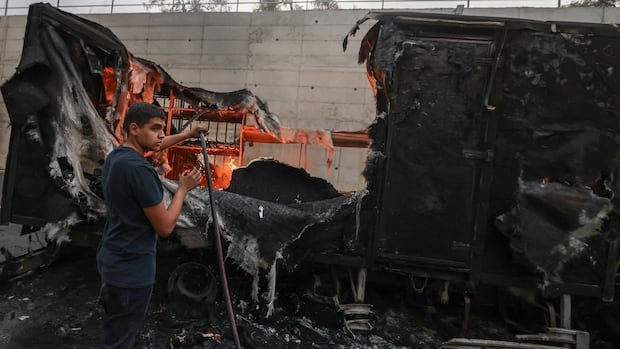Masked Israeli settlers hurled stones and torched dairy trucks, farmland and Bedouin structures, injuring four people on Tuesday in the latest in a surge of settler attacks in the occupied West Bank.
Videos on social media showed two charred trucks engulfed in flames, with a nearby building on fire.
The Israeli army says soldiers rushed to Beit Lid and Deir Sharaf after dozens of masked Israeli civilians attacked Palestinians and set fire to property. It said four Palestinians were treated for injuries.
Security forces dispersed the confrontation.
The Palestinian Red Crescent says it treated three people who had been beaten with sticks and stones. Israeli police said four Israeli suspects were arrested and held for questioning, in what it described as “extremist violence.”
Later, near the Baron Industrial Zone, where some of the masked settlers had regrouped, they attacked soldiers and damaged a military vehicle, the army said.
Palestinians and human rights workers accuse the Israeli army and police of failing to halt attacks by settlers.
Palestinian Minister Muayyad Shaaban, head of the Palestinian Authority government’s Colonization and Wall Resistance Commission, said settlers set fire to the four trucks belonging to the Junaidi dairy, agricultural areas and tin rooms and tents of Bedouin families, while hurling stones at residents.
He said the attacks were part of a campaign to drive Palestinians from their land and accused Israel of giving the settlers protection and immunity.
Shaaban called for sanctions against groups that “sponsor and support the colonial settlement terrorism project.”
Parties led by far-right Israeli settlers have significant influence in the coalition government of Prime Minister Benjamin Netanyahu. National Security Minister Itamar Ben-Gvir, who oversees the police force, is a hardline settler who has multiple convictions related to support for a designated terror group and for incitement of racism.
Finance Minister Bezalel Smotrich, who has previously proposed Israel annex most of the West Bank, approved the construction of more than 5,600 settler housing units in the territory this year alone — an all-time high for a single year, the Times of Israel reported.
Israeli police arrested several Israelis after what it described as ‘extremist violence’ in two occupied West Bank villages, the latest in a series of attacks by young settlers.
No deal for end of West Bank violence
The attacks have intensified in recent weeks as Palestinians harvest their olive trees.
Last Friday, the United Nations Office for the Co-ordination of Humanitarian Affairs (OCHA) said settlers staged at least 264 attacks on Palestinians in October, the highest monthly tally since the UN began tracking incidents in 2006.
“Since 2006, OCHA has documented over 9,600 such attacks. About 1,500 of them took place just this year, roughly 15 per cent of the total,” the UN body said in a statement last week.
Many of the attacks have targeted the territory’s annual olive harvest, with more than 140 Palestinians injured and some 4,200 trees and saplings vandalized, according to the OCHA.

This year’s olive harvest officially got underway about a week before Israel agreed to a ceasefire deal with Hamas in Gaza. But the tenuous ceasefire deal does not have any bearing on violence in the occupied West Bank, and some fear the situation in the territory is being ignored.
“International focus on maintaining the ceasefire in Gaza is crucial, but the West Bank must not be disconnected from these efforts, or considered a closed case because of Mr. Trump’s theoretical red line on formal annexation, Mairav Zonszein, Israel analyst for the International Crisis Group, wrote in an essay published Tuesday in the New York Times.
U.S. President Donald Trump, who brokered the ceasefire deal last month, said in September he would not allow Israel to annex the West Bank.
Some Israeli politicians also warn the ongoing settler violence could have greater consequences.
“Extremist settlers, with the encouragement of political figures, are acting deliberately to inflame the territories and create a dramatic security deterioration in Judea and Samaria,” opposition parliamentarian Gilad Kariv wrote in a post on X, calling the West Bank by the name the Israeli government officially uses to refer to the occupied Palestinian territory.
“Their goal is to ignite a third intifada, which would bring the [Israel Defence Forces] to act in a manner reminiscent of the operation in Gaza,” he wrote.
As Canada pushes to recognize a Palestinian state at the United Nations, Israel’s massive E1 settlement plan in the occupied West Bank threatens to erase that dream. For The National, CBC’s Margaret Evans explains what’s at stake and why Palestinians say it will crush any hope of statehood.
Israel seeks to expand West Bank settlements
Home to 2.7 million Palestinians, the West Bank has long been at the heart of plans for a future Palestinian state existing alongside Israel.
Successive Israeli governments have expanded settlements rapidly, fragmenting the land. More than half a million Israeli settlers now live in the territory.
The United Nations, Palestinians and most countries — including Canada — regard settlements as illegal under international law. Israel disputes this, citing biblical ties to the land and security concerns.
The Israeli government aims to expand settlements in the occupied territory even further, approving its controversial E1 settlement plan in August. The project, which would establish more than 3,400 settler housing units, would connect an existing settlement to Jerusalem.
But many Palestinians fear it would cut off their territory from East Jerusalem and put an end to their hopes for statehood.

French President Emmanuel Macron said Tuesday that any “plans for partial or total annexation” of the West Bank would “constitute a red line to which we will respond strongly with our European partners.”
He denounced Tuesday’s attacks during a meeting with Palestinian President Mahmoud Abbas in Paris, saying that “settler violence and the acceleration of settlement projects are reaching new heights, threatening the stability of the West Bank.”
CBC News reached out to Global Affairs Canada for comment but did not receive a response in time for publication.
Earlier this year, the Canadian government sanctioned Ben-Gvir and Smotrich in its fourth round of measures targeting the “facilitators of extremist settler violence against civilians.”
In September, Canada and several allies agreed to recognize the state of Palestine, in what Prime Minister Mark Carney’s office said was an effort to preserve the prospect of a two-state solution.
Palestinians living in the occupied West Bank say Israeli settler tactics have become more extreme in the past year. Margaret Evans and a CBC News team went to the South Hebron Hills to better understand what it’s like to live in the shadow of these illegal settlements.




